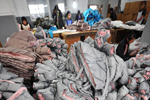Machinery sector facing friction
Updated: 2012-02-14 09:17
By Du Juan (China Daily)
|
|||||||||||
Manufacturers urged to boost competitive edge by developing high-end goods
BEIJING - The growth of China's machinery exports will slow this year because of the weakening global economy and increasing protectionism in developed countries, Cai Weici, deputy-president of the China Machinery Industry Federation, said on Monday.
|
 |
|
A production line at Yuchai Machinery Group Co Ltd, a major machinery producer in Yulin, Guangxi Zhuang autonomous region. The China Machinery industry Federation said that a weak global economy is expected to affect China's machinery exports this year.[Photo/China Daily] |
The federation said this year's growth in machinery imports and exports would be about 15 percent each, less than in 2011.
According to the General Administration of Customs, machinery exports rose 24.5 percent last year to $321.8 billion, while imports rose 21.2 percent to $309.4 billion.
Cai said that the growth rate of machinery exports would continue to fall in the coming years.
"Europe is an important market for China's machinery industry, so its economic gloom has led to a shrinking market and lower exports," said Cai.
"Further, increasing trade frictions will worsen the difficulties for exports."
He said that the increase in China's machinery exports in recent years had made some foreign companies feel "threatened" in their domestic markets.
Those concerns had led to trade actions against China, such as recent US anti-subsidy and anti-dumping probes against Chinese wind power equipment producers.
"Chinese companies should be prepared for more trade disputes and learn from them," said Cai. "The central government also needs to work harder on protecting domestic industries when it confronts trade barriers."
"Although we had (an industry) trade surplus of $12.4 billion, it mainly came from the downstream production of the industrial chain," Cai said.
He said Chinese machinery companies should invest more to develop high-end products, which are the "growth sector" but also the segment where global competition will intensify.
According to the National Bureau of Statistics, the machinery industry accounts for about 19 percent of China's industrial output.
Because of rising costs and an unstable export market, among other factors, the industry's annual profit growth in 2011 sank to 21.1 percent from 55.6 percent a year earlier.
The federation has forecast that profits would only grow about 12 percent this year.
Cai said the number of orders declined throughout 2011. As of the end of last year, the growth rate in orders had fallen to an annual 6 percent, compared with 30 percent in 2010.
The federation has forecast that the industry's output and sales would each grow 18 percent this year, compared with about 25 percent last year and 34 percent in 2010.
Excess domestic supplies will persist this year, according to the federation, adding to companies' difficulties in making a profit.









